Every morning, in thousands of schools across India, children sit on bare cement floors — legs crossed, backs hunched, notebooks balanced on their laps.
While on the flip side, the furniture we take for granted is made utilising approximately eight to thirteen million cubic meters of wood annually for furniture manufacturing. This demand is projected to rise to about 13.34 million cubic meters by 2030, reflecting the industry’s growth trajectory.
All the while, outside these classrooms, landfills overflow. Plastic bags tumble in the wind, discarded wrappers choke drains, and heaps of mixed waste grow higher each day — unsorted, unrecycled, untouched. It’s easy to miss the connection. But what if these two problems — broken learning spaces and broken waste systems — could solve each other?
The founder of ‘unWOOD’ found the answer to it.
unWOOD a vision with a bold central idea: to turn the plastic no one wants into the furniture everyone needs. By transforming unrecyclable waste into strong, wood-like material, unWOOD isn’t just tackling pollution, it is reshaping how we build, sit, and learn.
Vishal Mehta, environmental engineer and co-founder of unWOOD, says, “In the quest to meet the growing furniture demand, we forget how many trees are cut to make that single chair or table that you usually use. At a time when we’re talking about restoring biodiversity, tackling climate change, and protecting our forests.”
A problem even sustainability couldn’t solve
Before founding unWOOD, Vishal spent over 17 years in the infrastructure and renewable energy space. Ironically, while building facilities meant to save the planet, he saw another crisis unfolding.
“Even when you’re building a sustainable power plant, you bring in a lot of materials, and you generate a lot of waste,” he says. “Plastic waste, especially the flexible, low-value kind, was a huge challenge. No one recycles it. It just gets discarded.”
It’s the kind of plastic that wraps your chips, biscuits, groceries, Personal Protective Equipment (PPE) kits, and delivery boxes — too dirty, too mixed, too complicated to recycle.
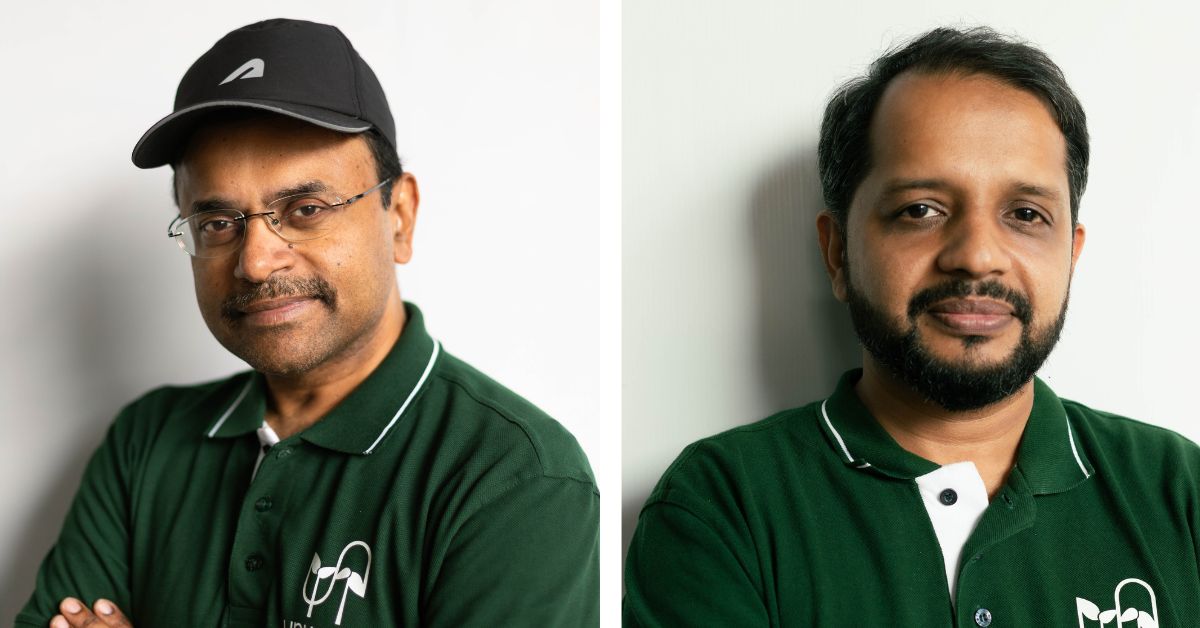
“I was frustrated,” Vishal admits. “Here I was, trying to follow sustainability standards, but this one problem felt impossible to fix.”
Then, in a moment of serendipity, he met Dr Babu Padmanabhan, an engineer, inventor, and materials scientist who had quietly been working on a solution — one that could not only deal with plastic waste but also prevent deforestation.
“I happen to meet Dr Babu at an informal event in 2021, and we were just getting to know each other’s work. I told him that while I work in the sustainability sector, I do not know how the problem of waste should be solved,” recalls Vishal.
“When I saw the solution that Dr Babu had created in his lab, this material that looked just like wood, but was made completely out of plastic, I simply loved the idea and I realised that I’ve finally found a fruitful solution,” shares Vishal with a smile.
Turning the impossible into innovation
Dr Babu’s career includes developing systems for the International Space Station and building a global manufacturing company, STEER World. Now, he has turned his attention to fixing one of Earth’s biggest environmental failures: plastic waste.
The concept of unWOOD primarily revolves around molecular interactions. “When everybody was focusing on the chemical interaction of different molecules, I figured out a way to make changes to who the molecules interact physically,” shares Dr Babu, who had to put in hours of research, finding the best equipment and hard work to develop the material.
“The integrated compounding engine, as I would like to call it, was ready in 2016. Before COVID-19, the formula for the material came to life,” shares Dr Babu.
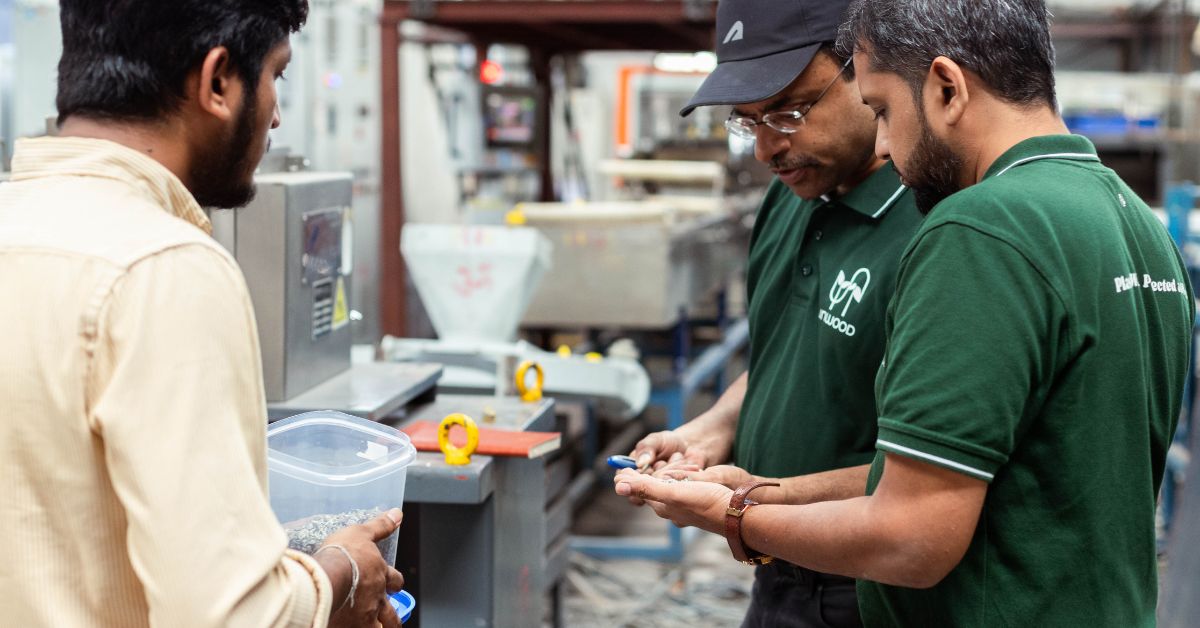
“The way humanity handles certain materials — especially plastics — has been fundamentally flawed,” he explains. “We’ve turned something durable and versatile into a pollutant.”
COVID-19 led to the problem of PPE kits and waste due to them. “It became very clear to me: we needed a way to give these complex materials a new life.” That’s when he developed a breakthrough material: unWOOD, a wood-like substitute created from hard-to-recycle plastic.
“With the formula created, we wanted to see how this can be made the best use of. In simple terms, just like how applications on the phone show the true potential of smartphone usage, I wanted to make the best use of unWOOD,” shares Dr Babu.
At the heart of it is something called Macro Molecular Fibre Matrix (MMFM) — sounds technical, but it’s actually pretty cool. Imagine you’re cleaning up after a party — there’s a mix of plastic wrappers, broken cutlery, and food containers. Normally, you’d need to sort each type of plastic, wash everything thoroughly, and then send it off to be melted at high temperatures. It’s messy, energy-heavy, and most of the time, a lot of that plastic just ends up in the trash.
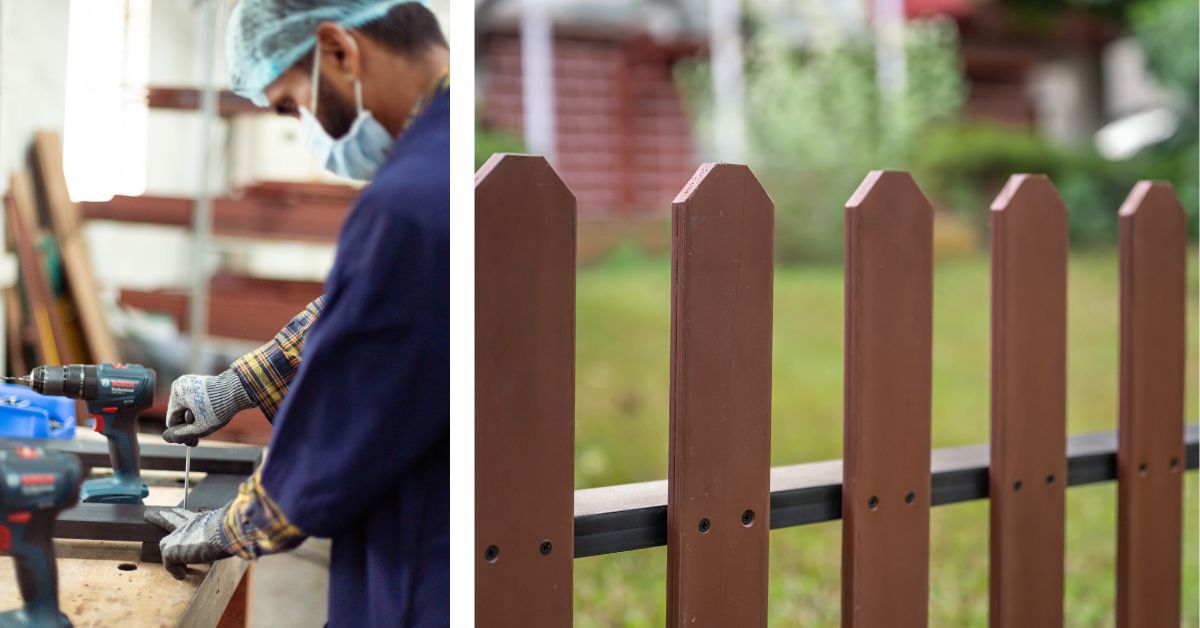
Now enter MMFM — kind of like a magic recipe created by unWOOD. Think of it as a special blender that doesn’t care if the plastic is clean, mixed up, or even hard to recycle. It combines all kinds of plastic with strong natural fibres and transforms them into something completely new: a tough, wood-like material that can be used to build furniture, doors, even walls.
So instead of trying to clean and melt plastic the old-fashioned way, MMFM takes the messy leftovers and turns them into something useful, without using water or heat. It’s like turning a pile of junk into a solid, beautiful table — quickly, cleanly, and with much less environmental cost.
“People liked the idea. But no one wanted to buy it.”
Despite the innovation, getting the market to adopt it was a different battle. “When I first saw the material, I was blown away,” Vishal recalls. “But when we tried taking it to market, no one wanted to take the risk. It was too new. Too unfamiliar.”
Back then, unWOOD was decided to be offered only as raw material. “We thought people would buy the boards and make products. But most buyers didn’t want to be the first to try something new.”
So Vishal changed the approach. “I said — let’s stop waiting. Let’s make the products ourselves. That’s how unWOOD became a brand of outdoor furniture.”
So, how exactly does unWOOD turn trash into treasure?
1. It starts with the waste no one wants
In the cities, Material Recovery Facilities (MRFs), clean plastic goes to regular recyclers but the soiled, mixed, and multilayered plastic usually gets tossed aside. That’s exactly the kind of trash unWOOD picks up.
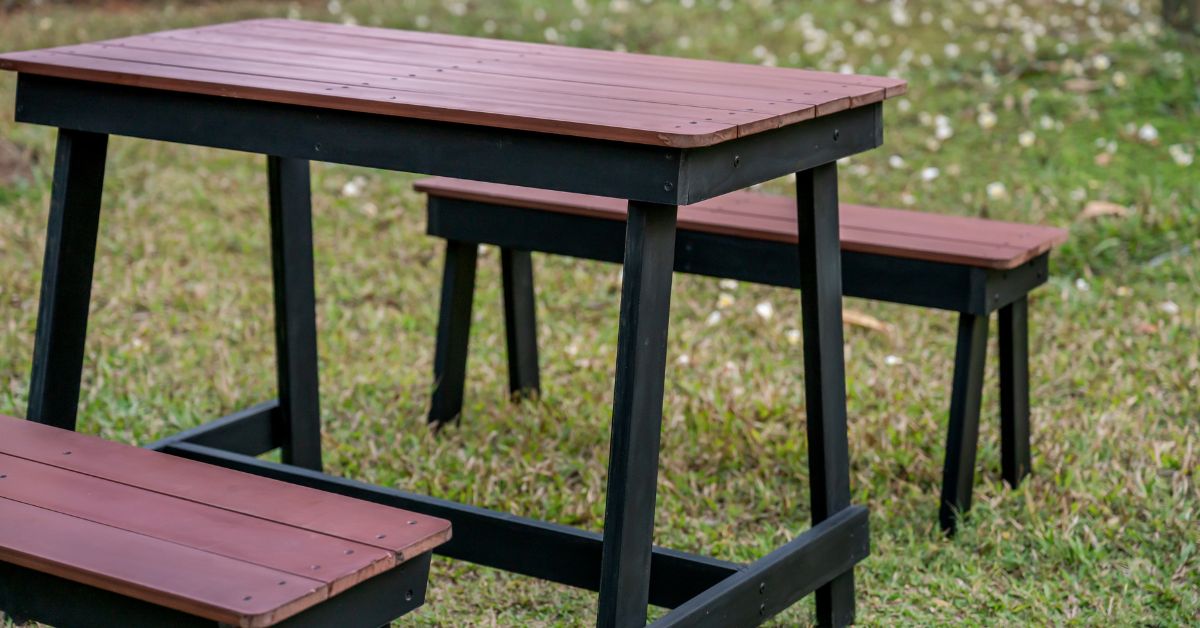
2. Chopped and ready — the SAFEReCYCLER
This stubborn plastic waste enters the SAFEReCYCLER, a powerful machine (think: an industrial blender) that grinds it all into tiny pieces, prepping it for the next transformation.
3. The magic mix — intelligent compounding engine
Next, those plastic bits go into a smart mixer, where they’re combined with natural fibres using Dr Babu’s patented process without any water, high heat, or segregating headaches.
4. Boards that behave better than wood
The output? Strong, durable boards that look like wood but are tougher — resistant to moisture, heat, and wear. All made without harming a single tree.
5. Big impact, small footprint: 44,000 chips packets save a mature tree
Every kilo of unWOOD reuses 500g of waste plastic and cuts down one and a half kilogram of carbon emissions.
unWOOD’s outdoor benches, tables, railings and fencing have found a unique niche. “Steel rusts, cement cracks, wood swells in moisture, and plastic breaks under the sun,” Vishal says. “We’re solving all of that.”
Just 11 park benches made from unWOOD save one fully mature tree, and repurpose about 14,000 plastic bottles, 44,000 snack packets, or 1,500 broken toys that would have otherwise polluted the planet.
Since officially launching as a company in April 2025, unWOOD has already recycled over 10 metric tonnes of plastic waste and saved 31 trees. And they’re just getting started.
Where learning meets sustainability: ‘Benches for Change’ initiative
Millions of children in underserved Indian schools study seated on bare floors — a reality that affects their health, dignity, and learning. unWOOD saw an opportunity to change this.
“We wanted to bring comfort and sustainability into classrooms that had neither,” says Vishal. “That’s how our ‘Benches for Change’ initiative began.” Through this programme, unWOOD collaborates with corporates, non-governmental organisations, and philanthropists to provide schools with sturdy, sustainable benches made from recycled plastic.
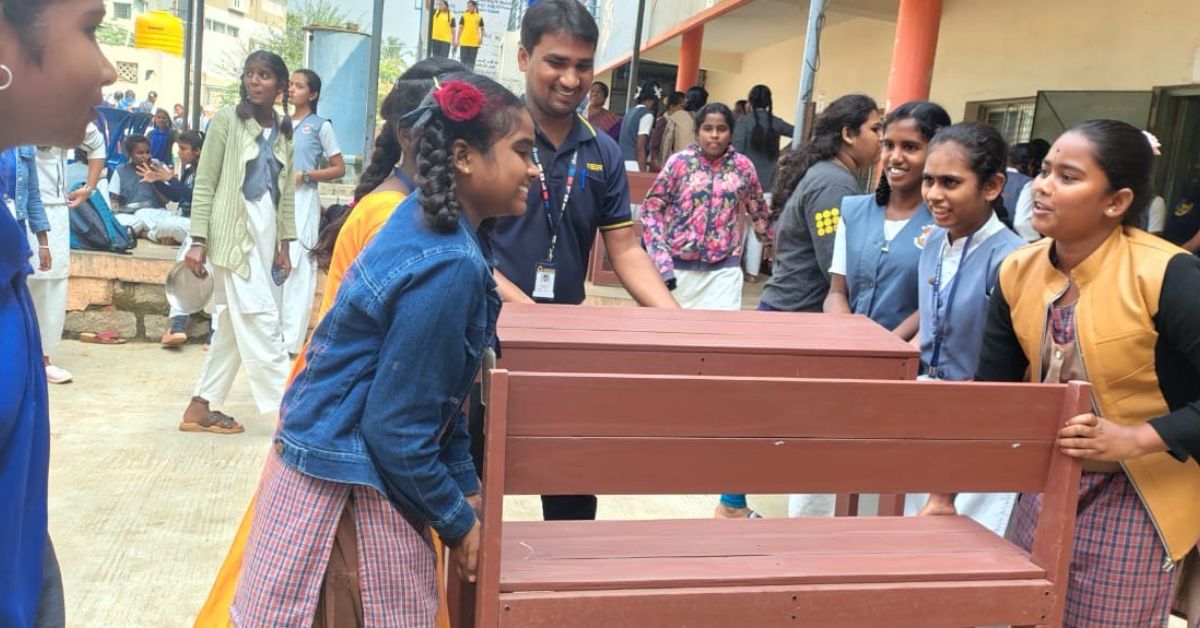
that lack access to adequate learning spaces.
They’ve already supplied four rural schools in Karnataka and identified 26 more nearby that need urgent support. The team has formal government lists detailing requirements per school and is working to raise funds through Corporate Social Responsibility (CSR) partnerships, NGO tie-ups, and direct donor outreach.
Kumar Naik, the in-charge headmaster at Manjunatha Girls High School, Neelamangala, shares that students are really fond of the new benches provided by unWOOD. “We received 50 benches, and our students found it comfortable and lightweight to move around at ease,” shares Kumar.
“The real impact,” Vishal adds, “is that kids begin to understand what the circular economy means. They see the benches and learn that waste doesn’t have to be waste — it can be transformed into something beautiful and useful.” To date, unWOOD has been able to provide roughly 230 benches benefiting 440 students across Karnataka.
Small team, big vision
Currently, unWOOD operates from a facility in Bengaluru’s Peenya Industrial Estate. A team of eight full-time staff and eight contract factory workers manage everything — from quality control to product development and logistics.
Their facility can manufacture up to 10,000 units per year, including furniture and semi-finished architectural products.
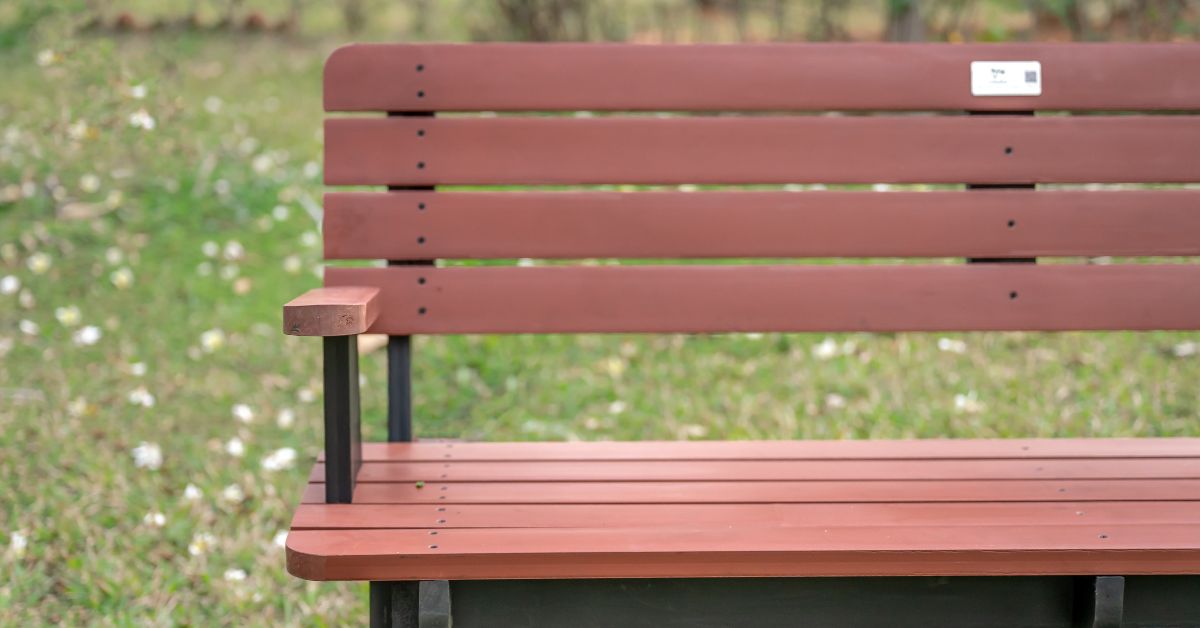
Even as a young startup, unWOOD has already been recognised by global institutions. It was recently selected by Climate KIC (Knowledge and Innovation Communities), an innovation platform funded by the IKEA Foundation, as one of the top eight ventures tackling climate change.
They’ve also presented to the Chief Minister of Andhra Pradesh and are now connecting with sustainable architects, builders, and city governments to embed unWOOD into public infrastructure.
Rethinking what waste means
In just a few months, unWOOD has shown that plastic waste doesn’t have to be a curse. It can be transformed, reused, and reimagined as beautiful, functional, long-lasting products.
It’s not just about saving trees or clearing landfills. It’s about changing mindsets, educating the next generation, and rebuilding our world with purpose.
“If we can make the world sit on trash — comfortably, sustainably, and proudly — then we’ve done our job,” Vishal concludes.
Visit unWOOD’s website to learn more about their products.
Edited by Saumya Singh; All images courtesy unWOOD
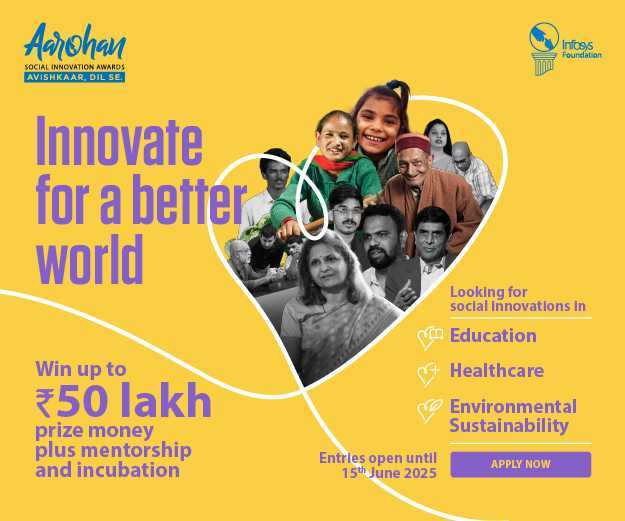
No comments:
Post a Comment